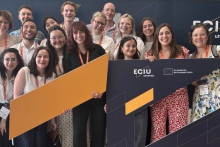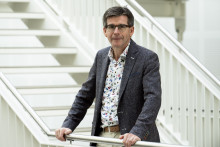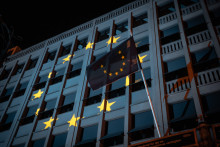UT researcher De Boer explains that the visit is part of a project run by the Polish technical university Lodz. ‘They have received government funding to help Ukraine with developing its system of universities. It is not very surprising that out of all places, they ended up at the UT,’ De Boer says. ‘Like the UT, Lodz University of Technology is a partner of the European Consortium of Innovative Universities (ECIU) for which we have provided a Leadership Programme for several years already. In short, we know each other.' In addition, research in the field of higher education is CHEPS' expertise. ‘We have a lot of in-house expertise on educational innovation and development. That's how things come together.’
Moving closer
De Boer considers the visit a first step of Ukrainian universities towards Western Europe by means of an introduction. ‘An exploration of what cooperation opportunities there are. Besides, the nine participants did not know each other either. It was a networking opportunity for them.’
Large degree of diversity
The content regarded the organisation of higher education in Europe. ‘We outlined the governance structures and the degree of autonomy at ECIU's 13 partner universities. The common theme was the large degree of diversity between the countries and their educational institutions. At every level, from human resources to funding, there are differences. There is no single European university.’ Other topics included trends and developments such as quality assurance, equality and sustainability. Moreover, funding was discussed as well as the organisation of research and entrepreneurship.

A packed schedule that concluded with a tour of the campus. ‘Of course you want to show that, as our campus is special,’ says De Boer. ‘We have organised similar seminars before, but this one in particular was exhilarating as well as an honour. It involved universities from a country at war. We didn't really know what to expect. But the atmosphere was good. The group was grateful. They had to overcome quite some hurdles. It takes effort to get out of Ukraine. For example, they needed an official letter confirming their participation. That made it special. Remarkably, we did not talk much about the war, while some knowledge institutions were destroyed or damaged. The representatives were mostly studious and professional. They did not play a victim role and radiated that they did not want to be brought down by it.’
Follow-up
A follow-up was not explicitly discussed. ‘Maybe other delegations will visit as part of this project. That is possible. In my opinion it is important for the country to stabilise first before considering further cooperation.’






